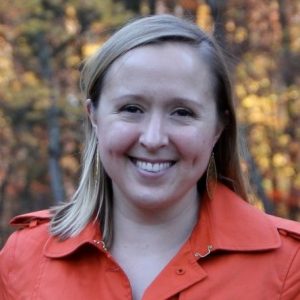Elizabeth Hart received her master’s in occupational therapy from UNC’s allied health sciences department in 2014. She is relying on her training during the pandemic.

Elizabeth Hart ’14 is relying on her training as an occupational therapist (OT) during the COVID-19 pandemic; Hart works at a local retirement community and credits the versatility of her degree to help residents maintain quality of life.
Prior to the pandemic, Hart’s typical day included working with residents in skilled nursing or in independent housing. Often, Hart worked with those who sought care for short-term rehabilitation, such as therapy after a fall. While Hart said she still manages some of those cases, she said her efforts facilitating engagement among residents have increased.
“In occupational therapy, we call it communication management,” Hart said. “Keeping in touch with loved ones […] That’s become a bigger part of my treatment plan—to help residents how to figure out how to use new technologies to stay in touch with their loved ones,” Hart explained.
Hart said she is using video chat resources such as FaceTime and Google Hangouts in order to connect families during the pandemic. Hart said she is still able to routinely visit with some residents who are used to frequent family visits.
“I’ve been called to step out of my traditional role,” Hart said. “Getting them outside every day—those sorts of things help them.”
Hart also she said the timeline to discharge patients from short-term stays in rehab has also become accelerated. As an occupational therapist, Hart provides resources to ease challenges that might arise from returning to home during a pandemic. This includes easing the transition home, especially when it comes to groceries and organizing in-home support.
Hart said her degree in occupational therapy has allowed her to think about both large-scale and small-scale tasks, ranging from organizing staff efforts to one-on-one treatment.
“That’s what I love about being an OT,” Hart said. “I can help people one on one, but I can also help people on a bigger organizational level. […] We have a good idea of how a person’s habits and routines shape who they are.”
She said the degree has given her clinical skills that can be applied in a variety of situations, including the emergence of a global pandemic.
“We need everyone to pitch in in whatever way they know how. I’m in a good position to help life enrichment, fitness, how to stay active, engaged, and connected when everyone’s routines have been disrupted,” Hart said.
While the community where Hart works does not have any COVID-19 cases, she said they’re preparing and taking extra precautions.
“Residents who do recover from COVID-19 are going to need rehab like everyone else,” Hart explained. When she arrives at work, she must take her temperature, wear a mask and answer screening questions, among other precautionary measures.
“It’s really scary. It contributes to this overall feeling of anxiety in these really uncertain times,” Hart said. “It’s not just unique to OTs, but I think everyone working in health care right now, especially if you’re working with a vulnerable population, faces a million reminders that there is a pandemic going on. […] I want to keep my family safe, and I also want to keep this community safe. It’s making me recognize how we’re all very connected to each other.”
Hart continues to see those connections at work—through residents who are making masks, volunteering to check in on their neighbors with a phone call, or delivering meals. Hart said there are residents who stand in their doorway and sing “You Are My Sunshine” every night at 8:00 p.m.
“If there’s one thing I’ve learned from working in a residential community, it’s that no one make it to their 80s or 90s, or even their 70s, without being resilient,” Hart said. “I see that all over campus.”
Hart said she realizes the weight of how every decision can impact care and wellbeing.
“I’m here, and it makes me think how hard it might not be to celebrate your grandmother’s 96th birthday together,” she said. “I can try to bring that person a bit of joy and connection in this uncertain time.”
The Division of Occupational Science and Occupational Therapy is housed in the Department of Allied Health Sciences. U.S. News & World Report ranked its occupational therapy master’s program as #10 in the country in spring 2020.